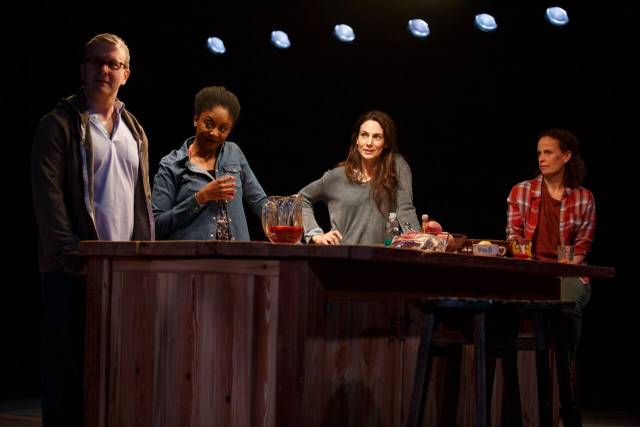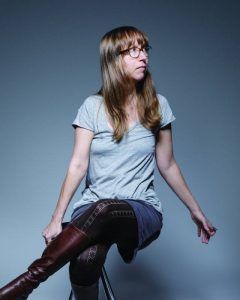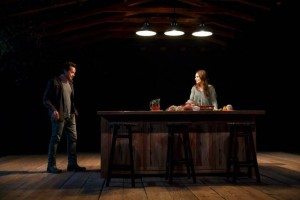

Anne Washburn's latest commission for Playwrights Horizons, Antlia Pneumatica, roots, or perhaps uproots, itself in the innate and intimate sense of mystery that surrounds death. To those who know the 1983 film The Big Chill, the plot may sound familiar; a group of college friends gather after the death of a member of their old social circle to cook, reminisce, and cook some more, considering the time that’s passed since they were last together and how they have and haven’t changed over the years.
For Nina, who is hosting the weekend at her now deceased parent’s house in the lonesome, beautiful Texas Hill Country with her two young children in tow, the surprise appearance of her college boyfriend, Adrian, brings the careening past into the present. Washburn gently weaves poetry and song into the tale to evoke a pervasive fog of nostalgia as she asks audiences to consider the strange fluidity of life and death and the way that people remain with us.
I recently had the chance to chat with Washburn about her latest piece, and she told me about all about inspiration, the act of listening, and magical thinking.

Can you first tell us a bit about getting involved with Playwrights Horizons? I believe this piece was commissioned?
It was a commission, well, they commissioned me, and they very sweetly didn't ask me what I was planning to write. I did have a play in mind for them which I have not yet written, but I ended up writing this other play instead and thought it might work. So I passed it to them, and they got it just after they had decided to do Mr. Burns, so they weren't going to be able to do it for a while, but they stuck with it and they did a couple of extremely helpful workshops with it, so they’ve been involved with it since it was a pup.
What was the seed that lead to the creation of this play? Was it the titular constellation, Antlia Pneumatica?
I wrote the play on a silent playwriting retreat in the Texas Hill Country, and in these retreats you are tasked with writing a play in a week. The goal of it is not to write a good play, the goal of it is just to write a play. You're also tasked with coming in with no idea of what you're going to work on. So I had no idea when I came in. I knew about Antlia Pneumatica the constellation because I had purchased a book of constellations for the retreat, and had been reading through it on the way over, and when I hit on it I thought it was hilarious. I thought it was something that it was something I would surely love to use some day in a play. So that was in my head, but I didn't think I would use it, it sort of crops up midway during the play, so... That was quick. (Laughs)
The ensemble is so terrific. Did you have a strong hand in picking the cast?
Oh god, yeah, I mean the playwright always does, in the first production of a new play, I mean you've got to. Though Ken [Rus Schmoll, director] is also... we think very much alike on casting. April Mathis was in an earlier workshop, Maria Striar was in an earlier workshop. I'd never worked with April before, but I'd wanted to for a long time and Maria is someone who I've known as a producer but I've also seen her work as an actor. Annie [Parisse] is someone I worked with ten years ago on a play called The Internationalist at the Vineyard Theater. And then Rob Campbell, I had just worked with him on Iphigenia in Aulis and it was a funny thing -- we were trying to figure out who could play Adrian, because it's a hard role to cast, and hadn't thought about Rob, but I was in the first day of rehearsals for Iphigenia and I was like oh, good lord, he would be perfect! And Nat [DeWolf], neither of us had worked with before, and he was a delightful find through auditions.
Did your cast play a big role in fleshing out the characters?
I mean we did a lot of back story discussion, with people sorting out, although it is the funny thing about working with actors because you'll have these big group, public discussions and then later on in private they'll leak their own biographical information they've come up with. It was also helpful because April went to school at UT Austin. They [the characters Adrian and Nina] talk about this bar, this moment when they're in this bar in college and Adrian was going to get a tattoo, but Nina got him drunk instead, and the name of the bar was Larry's by default, so we hit that and I was like, "OK, April, name a bar in Austin that would make sense for this scene." And she was like, "Ah, Slims." So we put it in.
When I wrote the play it's not like I had a fully fleshed biography for any of these characters. After I had written the play, I feel like I know a lot of things about them, but it's... I would say that in some cases I have an informed guess? And there are weird little things where I feel like, oh I actually do know that. So I would sort of talk about some things which I felt I knew. But we also came up with it together in a lot of ways.

In your written introduction to the play in the program, you mention wanting to "foreground the act of listening," and indeed, there are many moments in the play where the main action is happening off stage and we can only hear it, not see it. Can you talk a bit more about how that functions in the play?
I don't know how to answer that except to say that I myself find it pleasurable. I find listening in the theater to be pleasurable because it's pure. And also, I don't know, I think it tunes you into a wonderful thing about the theater, which is that kind of anything can be happening, taking place off stage. There's a very concrete world right in front of you, and then on all sides of that concrete world, the moment the actors step off stage, it can be whatever, and I think that's an exciting tension that you always have in the theater -- the weird fact that anything can come from off stage or anybody can suddenly lurch from that area. So I just like what offstage can be, and I think listening really foregrounds that.
So it's also about harnessing the imagination of the audience?
I guess it's about a certain kind of potential, which is not explicit, it's not "these are the secrets of the place” or “this is the secret way in which this world operates." It more has to do with, "this is an area in which more can happen than you expect" or "in which you don't quite know what to expect." That's the other aspect of listening -- I don't know, if you see a conversation happening on stage, and this is a totally crude example, you know there's a giant snake creeping up on them. But if you're listening to two people talk, you don't know. And/or you can't read facial expressions so it's more unpredictable where things are going to go. I just think when you listen to things the sense of possibility is increased overall and in all ways -- in terms of the fantastical and in terms of the psychological and in terms of the emotional. You're just a little bit more on your seat, because you have to be. Because you can't sum up the situation in the same way that you can more readily if you're looking.
Throughout the play, there is very realistic dialogue interpreted with poetry or even song, can you talk about your process for creating that balance?
I guess it just comes down to appetite. I guess I have an appetite for that as an audience member, so I'm making a play that I would like to see. But also, when we think of realistic dialogue, that's such a construct. Even just in terms of, people speak and communicate in ways that are so much more variable than what we think of as realism. I think there's a lot of stuff which comes under the umbrella of the surreal or the fantastical, which is actually perfectly realistic in a way, because we all of us operate in this kind of cloud of a couple of irreducible facts and then just huge amounts of speculation and projection and fantasy and what we think our story is and what we've decided limits us and what we've decided doesn't limit us. We're truly theoretical as creatures, so I think there's something about -- and I love me a really solid, super realistic play; It's not that I don't think that's a great thing to have happen -- but I guess I would just say that I think that a certain amount of the fantastical for me just feels observational, you know?
The way that the mysterious creeps into our everyday life...
I think that even if mysterious things aren't happening to us, I think we think mysteriously and I think we feel mysteriously. And I think even very very rational people are actually thinking quite magically, which is to say irrationally and fantastically.
"Antlia Pneumatica" opens at Playwrights Horizons on April 4.